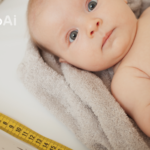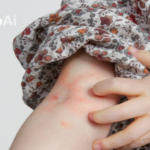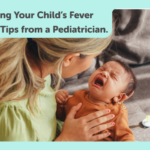It is common for young children to cough, however if your little one is experiencing persistent or intermittent coughs, it could mean something more.
Babies are not as prone to coughs as toddlers or older children, so it’s important to pay attention to your baby’s cough and understand what it could mean. With different kinds of coughs, treatments needed, and causes, this article will have everything you need to know to put your mind at ease.
Why do babies cough?
Coughing is typically caused by an irritation in our air passages and your baby’s cough is a sign they need to clear those airways to resume their normal breathing routine. The act of coughing itself is usually a way to help clear your airways and resume your normal breathing routine and state of health. Coughing also gets rid of irritants or infections in your child’s body. So while a cough can be a cause of concern, sometimes, it’s actually a good thing that your baby’s body is doing to protect itself.
While coughs are mostly caused by respiratory issues like colds, it can also be triggered by allergies, asthma, smoke inhalation, or swallowing something. Coughing is usually caused by the build up of fluid or mucus accumulated in the back of the throat which then forms into a cough. But, as we know, not every cough means the same thing.
In this article, we’re here to guide you in determining why your baby is coughing and what it could mean. However, as always, medical expertise and your healthcare provider’s opinion should be prioritized above all else and there is never a reason too small to check up with your baby’s doctor when it comes to taking care of their well-being.
What are the different kinds of coughs?
After being around your baby or other babies, you’ll notice that every cough is different and doesn’t sound the same. Oftentimes the difference between coughs is caused by the area where irritation lives in your baby’s body. Listening to your baby’s cough can give you an idea on what’s going on and with a visit to your baby’s doctor they’ll be able to use all the information to come to a conclusion and offer the best course of action. We know that a baby’s first cough or any number of coughs can be a scary experience for parents. That’s why we’re here to help.
So, what are the various forms of coughs to look out for when it comes to your baby? We have everything you need to know from common cold symptoms to signs of something more serious:
Wet/Dry Cough
- A wet cough will usually bring up a lot of mucus in your baby that could be made up of a mixture of things like phlegm, mucus, or cells from your baby’s lungs. A dry cough however, doesn’t bring up any mucus.
- A Dry Cough can typically be linked to many issues like allergies, asthma, bronchiolitis, colds, flu, pneumonia, sinus infections or even signal choking.
- A Wet Cough will usually be an indication of respiratory infections like a cold or pneumonia.
Common Cold Cough
- Your baby’s cough is most likely just a sign of a cold. If you see your little one sniffling, sneezing, having little to no appetite, and their eyes watering, they probably have a common cold.
- If this is the case, it’s okay to let them cough as it’ll help them clear their airways.
RSV Cough
- Respiratory Syncytial Virus can have similar symptoms as a common cold in babies and young kids. However, it can lead to serious issues like pneumonia or bronchiolitis.
- If your child’s cough is getting worse, you hear them wheezing, breathing rapidly, or notice they are rather tired, have a fever or their skin (e.g. their lips or fingernails) turn a blue/gray color, this is RSV and you should call your doctor.
- While some children can recover from RSV without treatment, it is always safer to bring your baby to the doctor due to the dangerous impacts of RSV.
Pneumonia/Bronchitis Cough
- If your baby is experiencing body aches or body chills, they could possibly be dealing with Pneumonia or Bronchitis. Both of these viruses are caused by an infection in the lungs, with Pneumonia starting off as a cold and Bronchitis resulting in an infection in the tubes that carry oxygen to your lungs, called “bronchi”
- Call your doctor and schedule an appointment as they could potentially prescribe antibiotics to treat your child’s condition and help them recover faster!
Croup Cough
- Croup Cough usually has worse symptoms at night and creates a high-pitch whistle sound when your baby is breathing.
- This cough is often caused by an infection in the vocal cords that triggers swelling. While this can be treated at home, if you feel more comfortable seeing a doctor for professional advice, you have every right to do so.
Whooping Cough
- Not as common as it once was, whooping cough is highly contagious. The sound of this cough is incredibly distinctive, with a child literally making a “whoop” sound and struggling to breathe in between coughing fits.
- Common symptoms of this will be similar to that of a classic cold with sneezing and a cough becoming persistent for over two weeks before the whooping sets in.
- Whooping Cough can be really dangerous and babies sometimes need to be hospitalized for this. So, please, call your doctor right away or get your child to a hospital.
Other Possible Causes of Coughs
- Other reasons your child might cough could be from different factors like allergies or negative inhalation. If you notice your child is coughing more than usual when a cat is around or breathing in secondhand smoke too much, you will want to remove these triggers or get your child tested for allergies.
- Your child could also have asthma, which is something you want to work with your doctor to take care of. Sinus infections are also a common cause of coughing.
- You may notice your child is coughing after getting over a sickness. While your child is healthy, they can still find themselves coughing repeatedly. Ask your doctor about lozenges or cough drops if your child is experiencing this irritation.
- If your child’s cough comes out with a thick yellow or green mucus, it could be a sign of cystic fibrosis. See your doctor if your child is also experiencing trouble gaining weight, consistent sinus infections or pneumonia as this could be further signs of cystic fibrosis which will need to be treated.
- Lastly, choking or swallowing an object can absolutely trigger coughing spells. If you are concerned about this or your baby usually gets their hands on anything and everything, go to the doctor right away and have them perform a chest X-Ray.
When to see a Doctor
Most of these coughs can be treated at home with certain remedies like giving your child fluids, elevating their head, having them sit in a steamy bathroom or using a humidifier. If your child is over one year of age, cough drops can also help with repeated coughs. And if they are even older, the doctor will likely prescribe cough syrup or medicine for particular treatments. However, sometimes a cough is more than just a cough. And if your child is struggling to breathe after coughing, has a high fever, is vomiting excessively, refusing to eat or sleep, begins to turn blue, or you suspect they’ve swallowed an object and could be choking on it, immediately contact your doctor or call 9-1-1. It is better to get a doctor’s opinion than to not.
Tips to prevent a cough from happening
Since coughs tend to be viral, it is best to keep your baby away from anyone who might have a virus. Continue with your everyday hygiene routine like making sure the family washes their hands, covering your mouth or nose when coughing or sneezing, and sanitizing objects around the house. Keeping your baby’s space clean can go a long way in keeping them healthy! But, don’t worry mama, every baby is bound to get sick at some point and this is a natural experience in motherhood to tend to your child on sick days. If you’re looking for more ways to safely track your baby’s cough and ease your mind, look no further than our new Cough Detection feature! Cubo Ai Smart Baby Monitor can detect when your baby is coughing and send you alerts so you can be on top of your baby’s cough and have all the information you need for their doctor to treat them.
*Please note, this is not a comprehensive list and we do not give out medical advice.
About the writer

Meghan Nelligan is a freelance writer and creative storyteller based in the United States. She is passionate about mental health, creative writing, and social media. She also manages an Instagram account and a portfolio site for her poetry where she shares weekly readings, personal writings, and favorite works. Check it out here: https://gempoetry.squarespace.com/
You might also like:
- How to Track Your Baby’s Growth: Understanding Height and Weight Development

- Tiny Hands, Big Bites: A Complete Guide to Baby-Led Weaning (BLW)

- Essential Guide to Solid Foods for Baby’s Growth

- Soothe the Scratch! Easing Your Child’s Atopic Dermatitis

- Managing Your Child’s Fever: Simple Tips from a Pediatrician

- How Much Sleep Does Your Baby Actually Need?
